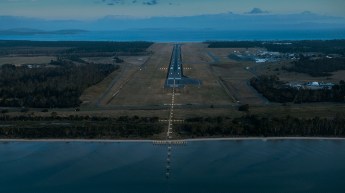
The ATSB has released its final report into the crash of a Eurocopter EC130 helicopter near Mount Disappointment, Victoria, two years ago.
The crash of VH-XWD on 31 March 2022, which killed all five people on board and was labelled “among the worst in Victoria’s history”, was a result of the pilot inadvertently flying into weather conditions that required instruments despite operating under visual flight rules (VFR).
VH-XWD and a second EC130, VH-WVV, were en route from Batman Park in Melbourne to the town of Ulupna when they encountered low cloud over Mount Disappointment. Both helicopters attempted to make a U-turn as conditions deteriorated, with one passenger on VH-WVV reporting “a white‑out with ground visibility no longer evident”; however, only VH-WVV was able to execute the manoeuvre safely.
“During the attempted U-turn without visual cues the second helicopter developed a high rate of descent, resulting in the collision with terrain,” said ATSB Chief Commissioner Angus Mitchell.
“Unfortunately, the pilot had no instrument flying experience, and the helicopter was not equipped with any form of artificial stabilisation, albeit neither of which are required for VFR flying.”
The ATSB’s report noted that Microflite had not incorporated several available risk controls for day VFR pilots to alleviate the risk of inadvertent entry into instrument meteorological conditions (IMC), though these were not required by law; it had also not implemented inadvertent IMC recovery procedures or pre-flight risk assessments for marginal weather conditions.
According to the ATSB, the only requirement for managing VFR inadvertent IMC risk events under the Civil Aviation Safety Regulations for rotorcraft air transport (Part 133) is avoidance.
“These risk controls may have included inadvertent IMC recovery training and basic instrument flying competency checks during operator proficiency checks,” said Mitchell.
“While avoidance of inadvertent IMC is important, it is not always assured, and Part 133 does not address the risk of recovery from an inadvertent IMC entry event.”
The ATSB has recommended CASA take action to further reduce the risk of inadvertent IMC events to helicopters, which the aviation safety regulator is considering.
In a statement, CASA CEO and director of aviation safety Pip Spence said lessons need to be learned from the incident to prevent similar tragedies in the future.
“All pilots will encounter bad weather at some stage in their flying careers. Thorough pre-flight planning and understanding of weather forecasts and meteorological conditions help pilots determine if the weather is acceptable for a visual flight rules flight,” she said.
“However, it is also important that pilots are able to recognise deterioration in the weather to make an early and safe decision to turn back while in clear conditions – this action will avoid flying into conditions for which they are not trained and equipped.
“We encourage pilots to refresh their skills using the tools and resources available on CASA’s pilot safety hub.”
Microflite has since made changes including improving training and proficiency checks with regard to IMC, as well as updating the avionics systems on its helicopters. Chief operating officer Rodney Higgins said the company’s thoughts remain with the families and loved ones of those killed in the crash.
“We acknowledge the substantial and ongoing impact that this accident has had on the families, loved ones, and colleagues of the four passengers and pilot who lost their lives,” he said.
“Microflite has participated openly and transparently with the ATSB during its investigation and in the preparation of the Report. Operational changes have been made to increase safety, as is detailed in the Report.
“We will continue to meet all regulatory requirements and to proactively develop our operations and safety practices into the future.”
In another recent report, the ATSB attributed the crash of a Cessna R182 Skylane in August of 2022 to inadvertent entry into IMC conditions under VFR.















